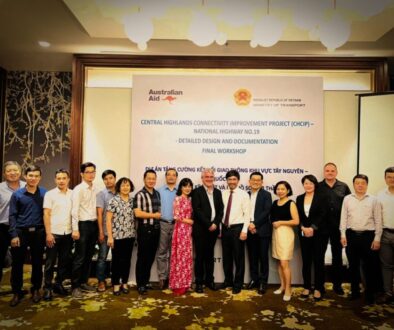Covid-19: Leaving no one behind. Creating a more inclusive transport sector for a more equitable Vietnam.
IN BRIEF
As Coronavirus has disproportionately affected the most vulnerable social groups in Vietnam, Aus4transport, as a key element of the Vietnam COVID-19 Development Response Plan launched by the Australian Government, continues to introduce an inclusive social perspective across all its activities.
The Program, through activities in its two branches, STREAM A: Facilitating Project Development and STREAM B: Unlocking opportunities through Innovation, continues to focus on addressing the needs of the most vulnerable groups and providing guidance for long-term approaches and practices that will positively influence social inclusion and improved livelihoods.
Since the first case of Covid-19 was identified in China, at the end of December 2019, Vietnam has taken incredible steps to contain the spread of the virus and provide social and economic support to the Vietnamese population. The rapid and strategic response carried out by the Government of Vietnam has impressed the international community, saving millions of lives and allowing life to resume as “close to normal” for many people in the country.
While Vietnam has managed to contain the COVID-19 outbreak so far, its economy has taken a significant hit, with transportation and tourism among the most affected sectors. With its double-sided strategy of battling the virus and simultaneously maintaining a strong and open economy, Vietnam has recorded less than over 6,000 Coronavirus cases and fewer than 50 death deaths (up to June 2021). Simultaneously, the National GDP still grew by 2.9%, which is an admirable achievement in the context of a global pandemic, but nevertheless, is the lowest recorded economic growth rate for Vietnam in the last 30 years.
However, the pandemic has also highlighted the huge socio-economic costs of inequality. Covid-19 is having a disproportionate impact on the most vulnerable groups, including the poor, ethnic minorities, migrants, informal sector workers, the elderly, children, women and people with disabilities, among others.
For example,
- Women have been overly affected by the closure of schools and the lack of alternative care services, as cultural norms have put increased pressure on them to care for the vulnerable members of the family unit.
- It is important to note that approximately 22 million children have been affected in Vietnam by the disruption of regular schooling, reducing access to subsidised meals and, in some cases, triggering school drop-outs.
- The risk of exposure to gender-based violence has also increased dramatically, with support helpdesks reporting that during the lockdown, calls requesting assistance increased by 50%.
- There has also been a decreased health-seeking behaviour combined with limited access to healthcare facilities. This is a concern especially for pregnant women, children and the elderly, as it could increase mortality rates and long-term health-related issues among already vulnerable groups.
Aus4transport is a key element of the Vietnam COVID-19 Development Response Plan that the Australian Government launched in 2020 with the objective of assisting the Government of Vietnam to maximise its efforts to overcome the negative impacts of the pandemic. The Program continues to ensure that all its activities introduce an inclusive perspective, catering for the needs of the most vulnerable groups and providing guidance for long-term approaches and practices that will have a positive impact on social inclusion and improved livelihoods.
Aus4Transport is currently delivering several Stream B activities directly contributing to a higher consideration and implementation of social safeguards policies across the Vietnamese Transport Sector (Raising awareness and skills of Gender Equality and Social Inclusion for MOT officials, building capacity for Transport Authorities to support the development of a universally accessible public transportation network, designing and delivering a Road Safety Awareness Campaign, producing Sector Standards to reduce environmental and social impacts of transport infrastructure projects, etc). Besides these, the Program’s two main engineering activities are also actively mainstreaming strong measures to mitigate social and environmental impacts of road construction projects and extend the socio-economic benefits of improved connectivity to vulnerable groups in affected areas.
In this regard, and following international best practices, as determined by the agreement between DFAT, the Multilateral Development Banks (ADB and WB) and the Government of Vietnam, and supported by Vietnamese regulations, the Detailed Engineering Designs for the Central Highlands Connectivity Improvement Project and the Northern Mountain Provinces Transport Connectivity Project, have been updating several crucial documents, such as the Environmental and Social Management Plans, Gender Action Plans, Ethnic Minority Development Plans, and the Project Resettlement and Land Acquisition Plans.
Social studies and analysis have been undertaken to better understand the nature of the difficulties and potential constraints that these road construction projects pose for the vulnerable groups along the area, paying especial attention to women, children, ethnic minorities, and those who will be directly affected by redistribution of land. The updated plans and strategies aim to ensure that social and economic development opportunities will be maximised and benefit those in greater need.




